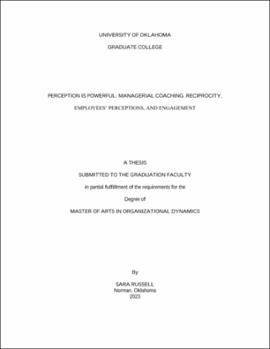| dc.contributor.advisor | Steinheider, Brigitte | |
| dc.contributor.author | Russell, Sara | |
| dc.date.accessioned | 2023-05-16T20:22:37Z | |
| dc.date.available | 2023-05-16T20:22:37Z | |
| dc.date.issued | 2023-05-12 | |
| dc.identifier.uri | https://hdl.handle.net/11244/337702 | |
| dc.description.abstract | Between 2021-2022, "Quiet Quitting" topped work-related headlines, and a June 2022 Gallup survey found that 50% of employees were ‘not engaged.’ Not engaged employees are the ones who are ‘quietly quitting.’ Organizations know managers are essential in the employee-organization relationship because employees view them as organizational representatives. This study aimed to address the recent increase in quiet quitting that many organizations have faced by exploring the relationships between managerial coaching and employee social and economic exchange perceptions, the mediating role of socioemotional support, and the influence of internalized reciprocity norms on exchange perceptions. This study also investigated the relationship between managerial coaching and employee engagement, with employee exchange perceptions mediating that relationship. A total of 162 participants provided usable data from an online questionnaire. Managerial coaching correlated to lower levels of economic exchange perception and higher levels of social exchange perception. The relationship between managerial coaching and the perception of economic exchange was much stronger for strong reciprocators than for others. However, reciprocity did not moderate the relationship between managerial coaching and social exchange perception. Managerial coaching was related to employee engagement directly and indirectly through social and economic exchange perceptions. Also, perceptions of social and economic exchange directly impacted employee engagement. The results suggest that organizations should incorporate coaching into their managers' skill sets to improve organizational performance. | en_US |
| dc.language | en_US | en_US |
| dc.rights | Attribution-NonCommercial-NoDerivatives 4.0 International | * |
| dc.rights.uri | https://creativecommons.org/licenses/by-nc-nd/4.0/ | * |
| dc.subject | Managerial coaching | en_US |
| dc.subject | Quiet quitting | en_US |
| dc.subject | Employee perceptions | en_US |
| dc.subject | Engagement | en_US |
| dc.title | Perception is Powerful: Managerial Coaching, Reciprocity, Employees' Perceptions, and Engagement | en_US |
| dc.contributor.committeeMember | Worley, Jody | |
| dc.contributor.committeeMember | Schooley, Robert | |
| dc.date.manuscript | 2023-05 | |
| dc.thesis.degree | Master of Arts | en_US |
| ou.group | Dodge Family College of Arts and Sciences::Department of Psychology | en_US |
| shareok.orcid | 0009-0009-7468-5202 | en_US |
| shareok.nativefileaccess | restricted | en_US |

